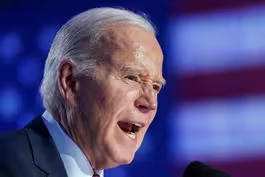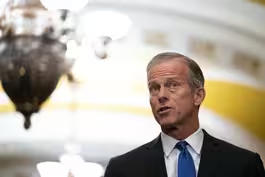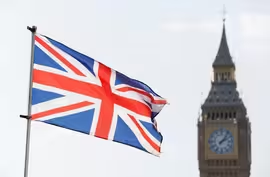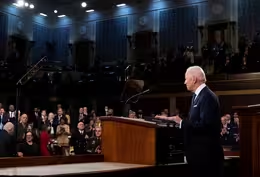
‘The Internationalists’ probes Biden foreign policy approach
Clip: 3/7/2024 | 7m 2sVideo has Closed Captions
‘The Internationalists’ explores Biden's foreign policy approach after Trump
During his State of the Union address, President Biden will portray himself as a steady steward of American interests around the world, drawing distinctions between his approach and that of former President Trump. Nick Schifrin spoke with Politico's Alexander Ward, author of "The Internationalists: The Fight to Restore American Foreign Policy After Trump," to learn more about Biden's strategies.
Problems playing video? | Closed Captioning Feedback
Problems playing video? | Closed Captioning Feedback
Major corporate funding for the PBS News Hour is provided by BDO, BNSF, Consumer Cellular, American Cruise Lines, and Raymond James. Funding for the PBS NewsHour Weekend is provided by...

‘The Internationalists’ probes Biden foreign policy approach
Clip: 3/7/2024 | 7m 2sVideo has Closed Captions
During his State of the Union address, President Biden will portray himself as a steady steward of American interests around the world, drawing distinctions between his approach and that of former President Trump. Nick Schifrin spoke with Politico's Alexander Ward, author of "The Internationalists: The Fight to Restore American Foreign Policy After Trump," to learn more about Biden's strategies.
Problems playing video? | Closed Captioning Feedback
How to Watch PBS News Hour
PBS News Hour is available to stream on pbs.org and the free PBS App, available on iPhone, Apple TV, Android TV, Android smartphones, Amazon Fire TV, Amazon Fire Tablet, Roku, Samsung Smart TV, and Vizio.
Providing Support for PBS.org
Learn Moreabout PBS online sponsorshipAMNA NAWAZ: The foreign policy focus of President Biden's State of the Union address tonight will be on Israel and Ukraine.
And he will present himself as a steady steward of American interests around the world, drawing a contrast between his approach and former President Trump's.
A new book examines how President Biden's foreign policies break, but sometimes embrace his predecessors.
Here's Nick Schifrin with more.
NICK SCHIFRIN: When Joe Biden became president, he proudly declared, "America is back."
He and his administration believed that former President Donald Trump and his administration had mistreated allies, become an unreliable partner, and pursued misplaced priorities.
But did the Biden administration really abandon Trump's foreign policy?
How did the collapse of Kabul humble Biden's most senior aides?
And how has the administration's strategy shifted, as it faces two unexpected wars in Europe and the Middle East?
That is the story told in the new book, "The Internationalists: The Fight to Restore American Foreign Policy After Trump."
The author is Alexander Ward, a national security reporter at Politico.
Alex, thanks very much.
Pleasure to have you here.
Let's start in Afghanistan.
You write: "For an administration that felt America had to be humble about the limits of their power, the preparation for Afghanistan was coated in hubris."
How?
ALEXANDER WARD, Author, "The Internationalists: The Fight to Restore American Foreign Policy After Trump": Well, part of it was that they expected, basically, that they could end the war with minimal chaos.
They expected chaos, to be clear, but not for it to be as chaotic as it was.
Part of it was that the intelligence they had at the time of the decision to leave was that it would take 18 to 24 months for the Taliban to take over.
And they didn't actually really question that intelligence or that timeline, even though there was even open-source material showing that the Taliban was ready for a pretty quick sweep across the country.
NICK SCHIFRIN: And, of course, there were internal people in the State Department saying, that intelligence was wrong.
ALEXANDER WARD: Precisely.
NICK SCHIFRIN: A senior official told you that: "Had we known we only had a few months after the president's decision in April to withdraw, we would have done things differently, probably so."
Do we have any idea what they would have done differently had they known?
ALEXANDER WARD: Really fast-track the rebuild of the SIV program, the Special Immigrant Visa program, which was to bring Afghan allies of Americans back to the U.S. One of the reasons they hadn't scaled that up so quickly, well, part of it was, it was decimated in the Trump years, but the other was they thought they had 18 to 24 months, so that was something that they could work on sort of in the longer term.
Another might have been the Pentagon decided speed was safety.
They went faster than even the White House and some of the State Department expected.
So I think, in the rethink of how this could have happened, one would have been a greater coordination between all the agencies, and especially on how quickly the military would leave, because that will -- that shrunk some of the options available to the administration.
NICK SCHIFRIN: You have this extraordinary anecdote about that lack of coordination, or at least part of the debate between state and DOD.
You write about a meeting in which a State Department official told four-stars, including the chairman of the Joint Chiefs of Staff, Mark Milley, sitting across the table that -- quote -- "The State Department had a higher risk threshold than the soldiers at the table, and Milley nearly jumped out of his chair."
How did that tension between state and DOD play out?
ALEXANDER WARD: The State Department was preparing to stay in Kabul.
They were preparing for a longer mission there, but it was the Pentagon that was saying, it's time to go, right?
The weakest part of a military is one that is retreating.
NICK SCHIFRIN: While they're retreating.
NICK SCHIFRIN: That's what they were worried about, yes.
ALEXANDER WARD: Precisely, yes, while they're retreating.
So, in that case, there was just a mismatch in what the goals were.
NICK SCHIFRIN: Despite the chaos, you write that, afterward, there was never any serious reckoning inside the administration about Afghanistan.
No one offered to resign, in large part because the president did not believe anyone had made a mistake.
That is an extraordinary thing.
Why not?
ALEXANDER WARD: Because, at the end of the day, it was the right strategic decision to leave.
That's how the administration sees it.
Now, with all that's going on in the world today, they would argue, look, isn't it great that we're out of a war we couldn't win after 20 years, that the military had no real solution for, that we spent a lot of money, time and treasure to execute?
And so it makes sense that we would leave.
NICK SCHIFRIN: How much of the disaster in Afghanistan informed their decision-making ahead of the Ukraine full-scale invasion?
ALEXANDER WARD: Quite a bit.
They wanted a lot more coordination between the agencies.
They wanted to let allies know what they were doing.
So, when the Ukraine intelligence was coming to the fore, the U.S. said, look, tell our allies what we're up to, what we know, tell the Ukrainians what we know, get every agency coordinated, build a Tiger Team, right, work on every single possible scenario.
NICK SCHIFRIN: The other focus, of course, for the administration today is Israel.
And you write about the early days of the Biden administration dealing with the crisis in Israel and Gaza.
And you chronicle Joe Biden's decades-long support for Israel and, as you put it, strategy of honey in public, vinegar on the phone.
How's that played out, not only what you write about in 2021-'22, but today?
ALEXANDER WARD: Well, if you talk to the Biden administration, in 2021, it worked quite well, because that conflict, while deadly and brutal, ended after 11 days.
And for October 7, the attack of October 7, which, of course, was brutal, and 1,200 people died in one day, then you, of course, have a far right government in Israel, and you have a public reeling after what they saw.
And so it's a much bigger, different context than it was in 2021.
The administration still uses that playbook, the honey in public, vinegar in private.
But with that context, with that different context, it's harder to have as much suasion over the Israelis as the U.S. had in 2021.
NICK SCHIFRIN: You quote an administration official in 2021 saying that the team was not putting a -- quote -- "effing second of effort into a two-state solution."
Did that have an impact in today's war?
ALEXANDER WARD: It's -- potentially, right We don't really know.
But one of the things critics were saying, from -- really from the Trump administration through the Biden administration, was that you can focus on the Abraham Accords and you can focus on normalization deals all you want, but the Israeli-Palestinian issue is still there, and it's still festering.
And so if you leave that wound to fester, it'll eventually cause you problems.
And so, and with the Biden administration, they really felt that a bank shot was better, that you could maybe get to the Palestinian-Israeli conflict through the normalization deals.
NICK SCHIFRIN: And that's one example, I think, of something that you rightly point out.
How has the Biden administration not abandoned Trump foreign policy?
ALEXANDER WARD: We cannot deny that there are many elements of Trumpism in Bidenism, one of which would be the competition with China, keeping export controls on them, keeping the tariff war going, one of which would also be the Abraham Accords, right?
That's a continuation of Trump era policy, and this general railing against free trade and globalization, a sense that we have to protect a lot of our industries here at home in order to make life better for the middle class.
You don't get the Biden administration foreign policy without Trump's win.
It is born from the trauma of Trump's victory.
Jake Sullivan, the national security adviser, is right there next to Hillary Clinton when she's conceding to Trump.
And what he's thinking is, hey, I was born in the traditional Democratic foreign policy thinking.
NICK SCHIFRIN: Minnesota.
ALEXANDER WARD: A Minnesota boy.
How did I lose populist politics to a New York billionaire real estate magnate?
And so he spends four years trying to figure out how to do this.
And that thinking, this foreign policy for the middle class epithet, has become the underlying intellectual framework for what we have seen in this administration so far.
NICK SCHIFRIN: Alex Ward.
The book is "The Internationalists: The Fight to Restore American Foreign Policy After Trump."
Thank you very much.
ALEXANDER WARD: Thanks for having me.
How a cyberattack crippled the U.S. health care system
Video has Closed Captions
Clip: 3/7/2024 | 6m 47s | How a cyberattack crippled the U.S. health care system (6m 47s)
News Wrap: Biden closes in on presidential nomination
Video has Closed Captions
Clip: 3/7/2024 | 4m 17s | News Wrap: Biden closes in on Democratic presidential nomination (4m 17s)
Sen. John Thune on the 2024 race, GOP leadership and Ukraine
Video has Closed Captions
Clip: 3/7/2024 | 8m 15s | Sen. John Thune on the 2024 race, GOP leadership and funding for Ukraine (8m 15s)
Tribal communities face challenges accessing the internet
Video has Closed Captions
Clip: 3/7/2024 | 3m 52s | Tribal communities face challenges accessing the internet (3m 52s)
UK proposal would crack down on extremism over war in Gaza
Video has Closed Captions
Clip: 3/7/2024 | 6m 36s | UK proposal would crack down on extremism over war in Gaza (6m 36s)
What to expect from Biden's third State of the Union address
Video has Closed Captions
Clip: 3/7/2024 | 7m 27s | What to expect from Biden's third State of the Union address (7m 27s)
Providing Support for PBS.org
Learn Moreabout PBS online sponsorship
- News and Public Affairs

FRONTLINE is investigative journalism that questions, explains and changes our world.

- News and Public Affairs

Amanpour and Company features conversations with leaders and decision makers.












Support for PBS provided by:
Major corporate funding for the PBS News Hour is provided by BDO, BNSF, Consumer Cellular, American Cruise Lines, and Raymond James. Funding for the PBS NewsHour Weekend is provided by...





